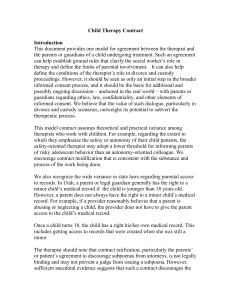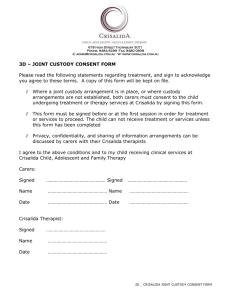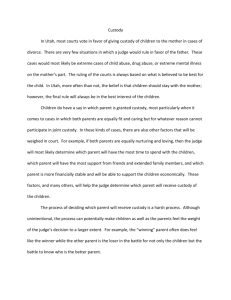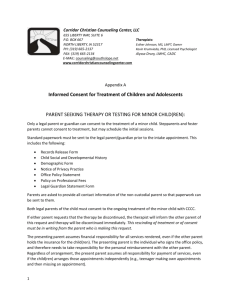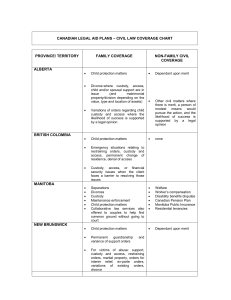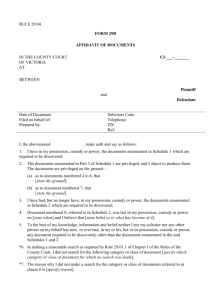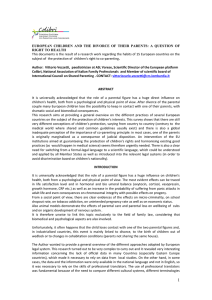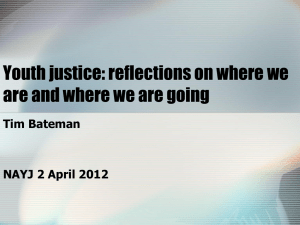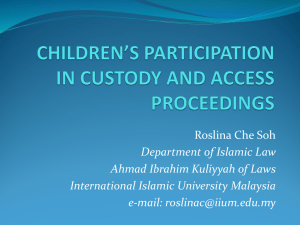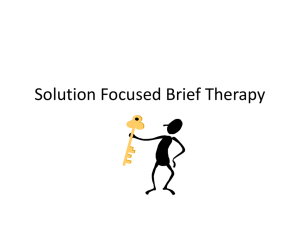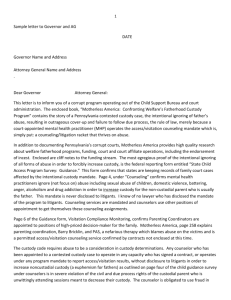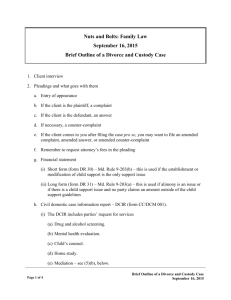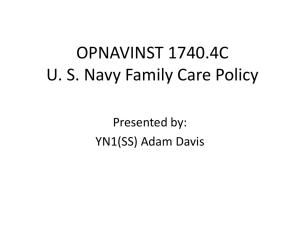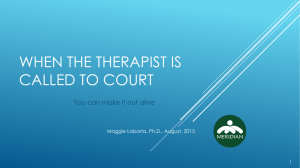Child Therapy Contract - National Association of Social Workers
advertisement
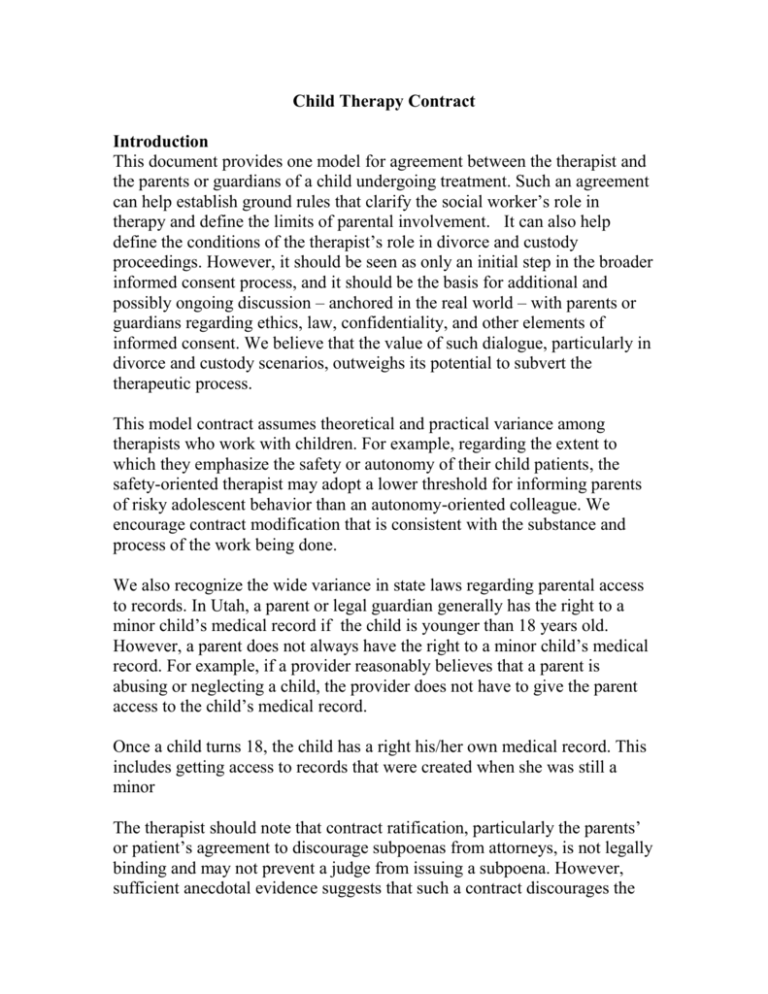
Child Therapy Contract Introduction This document provides one model for agreement between the therapist and the parents or guardians of a child undergoing treatment. Such an agreement can help establish ground rules that clarify the social worker’s role in therapy and define the limits of parental involvement. It can also help define the conditions of the therapist’s role in divorce and custody proceedings. However, it should be seen as only an initial step in the broader informed consent process, and it should be the basis for additional and possibly ongoing discussion – anchored in the real world – with parents or guardians regarding ethics, law, confidentiality, and other elements of informed consent. We believe that the value of such dialogue, particularly in divorce and custody scenarios, outweighs its potential to subvert the therapeutic process. This model contract assumes theoretical and practical variance among therapists who work with children. For example, regarding the extent to which they emphasize the safety or autonomy of their child patients, the safety-oriented therapist may adopt a lower threshold for informing parents of risky adolescent behavior than an autonomy-oriented colleague. We encourage contract modification that is consistent with the substance and process of the work being done. We also recognize the wide variance in state laws regarding parental access to records. In Utah, a parent or legal guardian generally has the right to a minor child’s medical record if the child is younger than 18 years old. However, a parent does not always have the right to a minor child’s medical record. For example, if a provider reasonably believes that a parent is abusing or neglecting a child, the provider does not have to give the parent access to the child’s medical record. Once a child turns 18, the child has a right his/her own medical record. This includes getting access to records that were created when she was still a minor The therapist should note that contract ratification, particularly the parents’ or patient’s agreement to discourage subpoenas from attorneys, is not legally binding and may not prevent a judge from issuing a subpoena. However, sufficient anecdotal evidence suggests that such a contract discourages the utilization of child therapists in the divorce process. In Utah, a social worker engaged in therapy, should not make custody recommendations. The contract also serves to remind the court of the strong correlation between privacy and therapeutic effectiveness. Note that we include an abbreviated version of the contract for those preferring less detail in the written agreement, but we recommend its use only if accompanied by more detailed discussions with patients/parents and detailed notes regarding such discussion. Also, it is important that you include in your contract any limitations regarding electronic communications (email, text) and state your preference for phone interactions for communications. If you accept text messaging or email it must be made clear to your client and their parents that you cannot ensure confidentiality of electronically mediated communications such as text or email. Full Draft Contract [On your letterhead] Prior to beginning treatment, it is important for you to understand my approach to child therapy and agree to some rules about your child’s confidentiality during the course of his/her treatment. The information herein is in addition to the information contained in the Patient-Therapist Agreement. Under HIPAA and the NASW Code of Ethics, I am legally and ethically responsible to provide you with informed consent. As we go forward, I will try to remind you of important issues as they arise. One risk of child therapy involves disagreement among parents and/or disagreement between parents and therapist regarding the best interests of the child. If such disagreements occur, I will strive to listen carefully so that I can understand your perspectives and fully explain my perspective. We can resolve such disagreements or we can agree to disagree, so long as this enables your child’s therapeutic progress. Ultimately, you will decide whether therapy will continue. If either of you decides that therapy should end, I will honor that decision, however I ask that you allow me the option of having a few closing sessions to appropriately end the treatment relationship. Therapy is most effective when a trusting relationship exists between the psychologist and the patient. Privacy is especially important in securing and maintaining that trust. One goal of treatment is to promote a stronger and better relationship between children and their parents. However, it is often necessary for children to develop a “zone of privacy” whereby they feel free to discuss personal matters with greater freedom. This is particularly true for adolescents who are naturally developing a greater sense of independence and autonomy. By signing this agreement, you will be waiving your right of access to your child’s treatment records. It is my policy to provide you with general information about treatment status. I will raise issues that may impact your child either inside or outside the home. If it is necessary to refer your child to another mental health professional with more specialized skills, I will share that information with you. I will not share with you what your child has disclosed to me without your child’s consent. I will tell you if your child does not attend sessions. At the end of your child’s treatment, I will provide you with a treatment summary that will describe what issues were discussed, what progress was made, and what areas are likely to require intervention in the future. If your child is an adolescent, it is possible that he/she will reveal sensitive information regarding sexual contact, alcohol and drug use, or other potentially problematic behaviors. Sometimes these behaviors are within the range of normal adolescent experimentation, but at other times they may require parental intervention. We must carefully and directly discuss your feelings and opinions regarding acceptable behavior. If I ever believe that your child is at serious risk of harming him/herself or another, I will inform you. Although my responsibility to your child may require my involvement in conflicts between the two of you, I need your agreement that my involvement will be strictly limited to that which will benefit your child. This means, among other things, that you will treat anything that is said in session with me as confidential. Neither of you will attempt to gain advantage in any legal proceeding between the two of you from my involvement with your children. In particular, I need your agreement that in any such proceedings, neither of you will ask me to testify in court, whether in person, or by affidavit. You also agree to instruct your attorneys not to subpoena me or to refer in any court filing to anything I have said or done. Note that such agreement may not prevent a judge from requiring my testimony, even though I will work to prevent such an event. If I am required to testify, I am ethically bound not to give my opinion about either parent’s custody or visitation suitability. If the court appoints a custody evaluator, guardian ad litem (GAL), or parenting coordinator, I will provide information as needed (if appropriate releases are signed or a court order is provided), but I will not make any recommendation about the final decision. Furthermore, if I am required to appear as a witness, the party responsible for my participation agrees to reimburse me at the rate of $XXX per hour for time spent traveling, preparing reports, testifying, being in attendance, and any other case-related costs. This information is adapted from the American Psychological Association Insurance Trust Abbreviated Contract Draft If you decide to terminate treatment, I have the option of having a few closing sessions with your child to properly end the treatment relationship. You are waiving your right to access to your child’s treatment records. I will inform you if your child does not attend the treatment sessions. At the end of treatment, I will provide you with a summary that includes a general description of goals, progress made, and potential areas that may require intervention in the future. If necessary to protect the life of your child or another person, I have the option of disclosing information to you without your child’s consent. You agree that my role is limited to providing treatment and that you will not involve me in any legal dispute, especially a dispute concerning custody or custody arrangements (visitation, etc.). You also agree to instruct your attorneys not to subpoena me or to refer in any court filing to anything I have said or done. If there is a court appointed evaluator, and if appropriate releases are signed and a court order is provided, I will provide general information about the child which will not include recommendations concerning custody or custody arrangements. If, for any reason, I am required to appear as a witness, the party responsible for my participation agrees to reimburse me at the rate of $XXX per hour for time spent traveling, preparing reports, testifying, being in attendance, and any other case-related costs. Signed (parent and therapist) _________________________ _________________________
